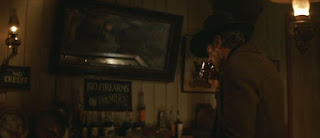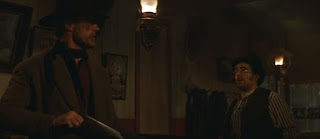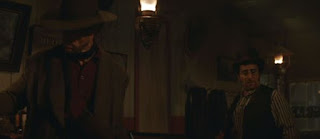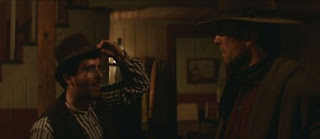The Story: It was always going to be that Clint Eastwood would never win an Oscar for acting. That's just the way it was. Eastwood was a minimalist, and if one was giving him credit, one might say he was an actor of enormous subtlety. He didn't want to show that he was acting, but the way he approached things—differently than most actors would—showed that he was thinking...a lot...about what he was doing...some of which was done with an underlying black humor.
When he did win an Oscar, it was for directing. Initially, his studio, Universal, humored his directing bug...and he was supported by his good friend and mentor, director Don Siegel.* But, if people didn't take his acting seriously, how could they his directing work? But, gradually, Eastwood's directing became less showy and by the time of The Outlaw Josey Wales, he was being taken seriously—he had enough clout in Hollywood, people had to.
Then, Eastwood finally got around to making Unforgiven—he'd been "sitting" on it for a decade after buying it from Francis Ford Coppola, who'd been working on it, changing it, never to his satisfaction, then giving up on it—he insisted on sticking to the original script. He'd been doing a string of pulpish mystery stories, with less and less stunt work required of him. The people he was hiring were becoming more and more sophisticated...even if the material wasn't.
Then, he made this, and whatever complaints people had about Eastwood's previous work, they couldn't deny the power of this one. And Eastwood's directing "technique" by this time was remarkably simply and considered. Hire good people. Trust the script. Don't interfere too much. The actor who plays W.W. Beauchamp in this scene—Saul Rubinek—has a lot to say about this in the interview provided (in fact, watch that first before reading any farther).
Rubinek tells the story of writer David Webb People's (The Day After Trinity, Blade Runner) weeping after a guest-screening of Unforgiven, explaining with unaccustomed surprise and relief that Eastwood stuck to the script. Well, he did and he didn't. Oh, the particulars are there, but some of the dialogue is different (things not used are crossed out and substitutions are in green font). Some of Peoples' rougher language was excised—especially things that might give one...pause...and take one "out" of the scene. Eastwood's Munny makes a bigger deal of making sure the writer, Beauchamp, isn't armed, insisting he hand over a rifle. And the way Eastwood stages it, Munny is already preoccupied with making his escape, having "gotten away with" a close-quartered shoot-out in the saloon (rather than wasting time "jawing" with Beauchamp). That's practical.
But, the essence and a lot of the dialogue is there (including one of my favorite absurdist lines "I don't deserve this...I was building a house!"). And the long sense of dread that the scene evokes by the cold bloodedness of the act is enhanced by the appropriately dark saloon, the slightly exaggerated (and well-timed) cracks of thunder...and Eastwood's favoring of long drawn-out "takes" with miniscule camera moves—something he learned from director Sergio Leone.*
Eastwood deserved his Oscar win, but, as anyone who's ever been nominated will tell you "Deserves got nothing to do with it."
The Set-Up: William Munny (Clint Eastwood) was "a known thief and murderer, a man of notoriously vicious and intemperate disposition" in his wilder, drinking days. All that changed when he married Claudia Feathers, moving West and establishing a farm. Now a widower with two children and the farm failing, Munny takes a job relayed to him by a would-be gunfighter, The Schofield Kid (Jaimz Woolvett) to avenge the slashing of a prostitute in the town of Big Whiskey, Wyoming. Munny sets off with the Kid and an old outlaw friend, Ned Logan (Morgan Freeman) to collect the bounty set by the Big Whiskey women.
But, Munny gets beaten up and Ned killed by the sadistic sheriff in town, "Little Bill" Daggett (Gene Hackman), and, fortified by drink, the formerly remorseful gun-man has confronted "Little Bill" to exact revenge on his friend. In the gun-fight, Munny has shot five men, including "Little Bill," now lying on the floor in the Big Whiskey saloon. The rest of "Little Bill's" deputies are dead or have fled, leaving Munny with one surprise in the form of writer W.W. Beauchamp (Saul Rubinek).
Action.
And they scramble over each other dashing toward the
Billiard Room and Munny stands up and looks around and he
looks at Clyde who is groaning, his face covered with blood
and everyone else, Little Bill, Andy and Fatty are still,
Munny walks over to the bar,
and drinks sloppily with effort, the pistol still in his right hand.and then Fatty seems to move and Munny levels his pistol and
what happens is WW crawls out from half-under Fatty and WW
is covered with blood and he is shaking like a leaf.
MUNNY Pick it up!WW Yeah.
WW That's a Spencer rifle, isn't it?
MUNNY That's right.
MUNNY That's right.
WW
when confronted by superior
numbers, the experienced
gunfighter will fire on the best
shots first.
WW Yeah.
Unnoticed on the floor, Little Bill is conscious though
blood is coming out of his mouth and he has been written
off.
One hand is shifting on his pistol and he can hear
Clyde moaning sporadically.
On the floor, Little Bill is fighting for consciousness,
fingering his pistol.
MUNNY
(suddely ominous,
pistol pointing)
I could tell you who was last,
mister. All I can tell you is
Little Bill, on the floor, raises up his pistol in his
shaking hand and aims at Munny's back maybe six feet away
and he is shaking bad as he draws the hammer back and...
MUNNY
Missed again, asshole.
Little Bill is bleeding
from the mouth having taken a shot in the lung and he is
very weak and all he can do is look up at Munny
MUNNY
(aiming his pistol
point blank)
"Deserve" don't mean shit, Little
Bill. "Deserves" got nothing to do with it...
LITTLE BILL
(the pistol in his face)
I'll see you... in hell, you
three-fingered asshole William Munny.
Words by David Webb Peoples
Pictures by Jack N. Green and Clint Eastwood
Unforgiven is available on DVD and Blu-Ray from Warner Home Video.
*








































































































































































No comments:
Post a Comment